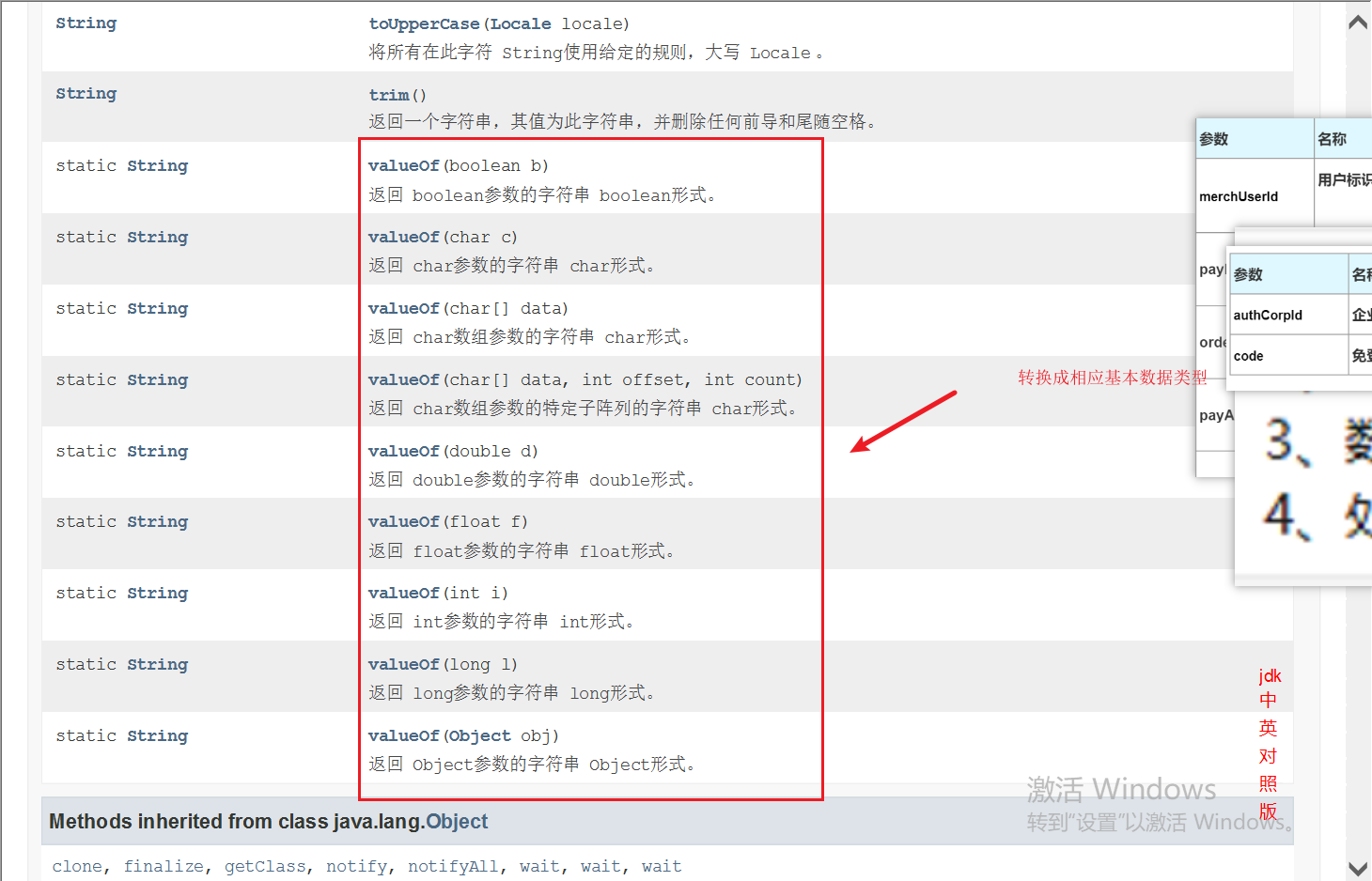1.String类当中常用操作方法
2.演示
1 package com.example.demo.string; 2 3 import com.sun.media.sound.SoftTuning; 4 import org.apache.commons.lang.text.StrMatcher; 5 import org.junit.jupiter.api.Test; 6 7 /** 8 * 介绍String类当中常用的方法 9 * <p> 10 * 常用方法 11 * 拼接方法 12 * 替换方法 13 * 转换方法 14 * 其他方法 15 * 16 * @author wangjei 17 * @version 1.0 18 * @date 2021.8.6 19 * @see {@code String} 20 */ 21 public class StringDemo { 22 23 @Test 24 public void stringDemo() { 25 26 /** 27 * boolean equals(String str); 28 * boolean equalsIgnoreCase(String str); 29 * boolean isEmpty(); 30 */ 31 String str = "abcdefghigk"; 32 boolean abc = str.contains ("wangjie"); 33 System.out.println (abc); 34 35 String str1 = "wangjie"; 36 boolean abc1 = str1.equals ("abc"); 37 System.out.println (abc1); 38 boolean wangjie = str1.equals ("wangjie"); 39 System.out.println (wangjie); 40 boolean wangjiE = str1.equals ("wangjiE"); 41 System.out.println (wangjiE); 42 boolean wangjiE1 = str1.equalsIgnoreCase ("wangjiE"); 43 System.out.println (wangjiE1); 44 boolean wangjiee = str1.equalsIgnoreCase ("wangjiee"); 45 System.out.println (wangjiee); 46 47 String string = "wangjiejie"; 48 System.out.println ("isEmpty:" + string.isEmpty ( )); 49 50 String string1 = ""; 51 System.out.println ("isEmpty:" + string1.isEmpty ( )); 52 53 /** 54 * char charAt(int index) 返回指定索引处的 char值。 55 * int length() 返回此字符串的长度。 56 * int indexOf(String s) 返回指定字符串s第一次出现的字符串内的索引。 57 * int lastIndexOf(String s) 返回指定字符串s的最后一次出现的字符串中的索引。 58 */ 59 // * char charAt(int index) 返回指定索引处的 char值。 60 61 String str4 = "wang'jie"; 62 System.out.println ("charAt():" + str4.charAt (0)); 63 // int length() 返回此字符串的长度。 64 System.out.println ("string():" + str4.length ( )); 65 //indexof 66 System.out.println ("indexof():" + str4.indexOf ("e")); 67 //lastIndexof() 68 System.out.println ("lastindexof():" + str4.lastIndexOf ("e")); 69 70 /** 71 * boolean contains(CharSequence s) 当且仅当此字符串包含指定的char值序列时才返回true。 72 * boolean startsWith(String prefix) 测试此字符串是否以指定的前缀开头。 73 * boolean endsWith(String suffix) 测试此字符串是否以指定的后缀结尾。 74 * boolean equals(Object anObject) 将此字符串与指定对象进行比较。 75 * boolean equalsIgnoreCase(String anotherString) 将此 String与另一个 String比较,忽略案例注意事项。 76 * boolean isEmpty() 返回 true如果,且仅当 length()为 0 77 */ 78 79 String str5 = "wuyahuimiaodada"; 80 //contains() 81 System.out.println (str5.contains ("wuyuhui")); 82 //startwith 83 System.out.println (str5.startsWith ("wu")); 84 //endwith 85 System.out.println (str5.endsWith ("hui")); 86 //euals 87 System.out.println ("equals():" + str5.equals ("abc")); 88 //equalsIgnoreCase() 89 System.out.println ("equalsIgoreCase():" + str5.equalsIgnoreCase ("abc")); 90 //isEmpty() 91 System.out.println ("isEmpty():" + str5.isEmpty ( )); 92 93 /** 94 * byte[] getBytes() 使用平台的默认字符集将该 String编码为一系列字节,将结果存储到新的字节数组中。 95 * char[] toCharArray() 将此字符串转换为新的字符数组。 96 * String toLowerCase() 使用默认语言环境的规则将此 String所有字符转换为小写。 97 * String toUpperCase() 将此 String所有字符转换为大写,使用默认语言环境的规则。 98 * static String valueOf(boolean b) 返回 boolean参数的字符串表示形式。 99 */ 100 101 String str6 = "abdf"; 102 byte[] bytes = str6.getBytes ( ); 103 System.out.println ("============================"); 104 System.out.println ("getBytes():" + str6.getBytes ( )); 105 for (int i = bytes.length - 1; i >= 0; i--) { 106 System.out.println (bytes[i]); 107 } 108 System.out.println ("============================"); 109 char[] chars = str6.toCharArray ( ); 110 for (char aChar : chars) { 111 System.out.println (aChar); 112 } 113 System.out.println ("=============================="); 114 115 String s = str6.toLowerCase ( ); 116 System.out.println ("toLowerCase():" + s); 117 118 String s1 = str6.toUpperCase ( ); 119 System.out.println ("toUpperCase():" + s1); 120 121 /** 122 * boolean b = true; 123 * String s1 = String.valueOf(b); 124 * System.out.println("s1: " + s1); 125 * 126 * int number = 100; 127 * String s2 = String.valueOf(number); 128 * System.out.println("s2: " + s2); 129 */ 130 131 boolean b = true; 132 String s2 = String.valueOf (b); 133 System.out.println (s2); 134 System.out.println (String.valueOf (b)); 135 136 /** 137 * String replace(CharSequence target, CharSequence replacement) 将与字面目标序列匹配的字符串的每个子字符串替换为指定的文字替换序列。 138 * String[] split(String regex) 将此字符串拆分为给定的 regular expression的匹配。 139 * String substring(int beginIndex) 返回一个字符串,该字符串是此字符串的子字符串。 140 * String substring(int beginIndex, int endIndex) 返回一个字符串,该字符串是此字符串的子字符串。 141 */ 142 143 String string4 = "a,b,c,d"; 144 //split() 145 String[] split = string4.split (","); 146 for (String s3 : split) { 147 System.out.println (s3); 148 } 149 //replace() 150 String replace = string4.replace ("a", "wangjei"); 151 System.out.println ("replace():" + replace); 152 153 //substring() 154 String substring = string4.substring (1); 155 System.out.println ("substring:" + substring); 156 //substring(int beginindex,int endindex); 157 String substring1 = string4.substring (0, 3); 158 System.out.println ("substring1:" + substring1); 159 160 161 /** 162 * String concat(String str) 将指定的字符串连接到该字符串的末尾。 163 * String trim() 返回一个字符串,其值为此字符串,并删除任何前导和尾随空格。 164 */ 165 166 //concat(Strig str) 167 String string5 = "wangjiesddddddd"; 168 String wuyahui = string5.concat ("wuyahui"); 169 System.out.println ("concat():" + wuyahui); 170 //trim() 171 String trim = string5.trim ( ); 172 System.out.println ("strm():" + trim); 173 } 174 }
补充:
方法 string.valueof(基本数据类型);
api文档截图:





